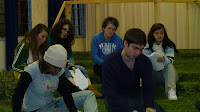We then read a section of the script which focussed on what Stephanie (the central character in the play) has lost due to her illness (she suffers from MS) – her ability to play the violin and ultimately her Music. The script also explored the role that parents play in shaping the future of their children. Stephanie had a very supportive mother (who died young) and a less supportive father. But his lack of support encouraged her to prove him wrong and make a success of her music. This lead to a discussion about parental pressure verses parental support; and whether anyone felt that their parents lived their lives though them, or were trying not to repeat their own mistakes with them.
We also talked about how we would feel if something we valued was from us, like our ability to play an instrument, our career, or even the physical abilities we take for granted – and whether it important, or not, to be optimistic and put a positive spin on a difficult situation. We played the 'No... Yes and... Yes but...' game to explore the idea of blocking an idea or going with it. Most people found it easier to use 'Yes but' than saying 'No'. Participants were then asked to think about something that they have lost (or would hate to loose) and to find an object to represent this. They then created physical monologues to express this loss (i.e. coming up with five of six actions or movements that could be repeated). They then taught these to one another, without communicating verbally, so that everyone had a new, inherited loss that was no longer personal to them. They then worked on creating verbal monologues to accompany their new inherited loss, expressing this sense of loss, but potentially giving it a whole new meaning. Again, the results were extremely positive and creative. Lots of ideas were generated for Tanya (we clearly have talented writers in the group); and we also worked on staging the pieces too.
Next we worked on how you might communicate your loss to an audience - and how we might share our secrets/problems/fears – through counselling, writing a diary, praying to God? We started with a fun, physical warm-up. In groups, participants had 10 seconds to physically create a mode of communication, using their bodies and working together as one, from a message in a bottle to a diary; and a PC to a mobile phone. We then asked participants to work alone, or in pairs, to create a short piece to illustrate how they might share their anxieties and problems. Some chose to confide in friends; others to talk in chat rooms anonymously; others in writing or though other art forms like painting or singing. Again, so fantastic work was generated - everyone is really stepping up to the challenge and pushing themselves to create exceptional work.
Finally, we returned to discussing music and its importance to us. Some people felt that they would be completely lost with out it - it has therapeutic value, it lets you unwind and de-stress, it is emotive, it helped you concentrate, it entertains etc. We then also asked everyone to name two tracks that they love, and Tanya is going to put together a LAB soundtrack for next session. She also set everyone two tasks for the January LAB. Firstly, anyone who has a special talent - be it singing, dancing, writing poetry, playing an instrument etc - they should prepare something to share with the group next time; and secondly – find two adverts that show a young person looking to change their lives in some way.
























